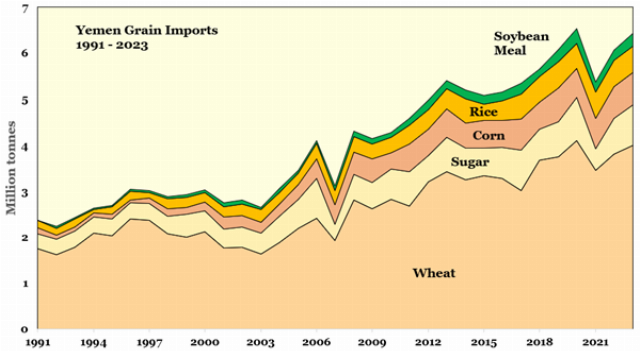Just stop feeding the Houthis
In the Middle East the traditional way of dealing with tribes that have attacked your interests is to counterattack into their territory and wipe them out. That was in ancient times. Let’s skip forward a couple of thousand years to the First Barbary War. After the War of Independence, Americans were no longer protected by the Royal Navy and pirates based in Tripoli demanded tribute for safe passage through the Mediterranean. In 1803, the U.S. frigate Philadelphia ran aground off Tripoli with 297 crew taken prisoner. The situation was very much like the Houthis today hitting passing ships in the Red Sea with cruise missiles and ballistic missiles.
To clean up the pirates operating along the Tripoli coast, in 1805 a U.S. Marine unit landed at Alexandria in Egypt then marched 400 miles west. The Marines captured the pirate base in the Battle of Derna and released the crew of the Philadelphia. Note that U.S. forces had to cross the Atlantic to fix a problem in the backyard of the European powers who were then happily fighting amongst themselves in the Napoleonic Wars. The pirates of the North African coast had long been an irritation, raiding as far west as Iceland in 1627. Again, the situation with the Houthis is much the same today with them now saying they will hit ships in the eastern Mediterranean.
Once again it was U.S. forces which came to do battle in order to keep the sea lanes open. Some European ships joined in but most have retired from the fray because their onboard stocks of defensive missiles became depleted. The U.S. has spent some one billion dollars on intercepting the Houthi missiles to date. The missiles shot down, supplied by Iran, cost a fraction of that. Normally and ideally, the U.S. Marine Corps would land to give the locals a good whacking but not stay for any nation-building. But the Marines have parked up all their tanks and half their artillery. They have decided that their role is to take up position in the First Island Chain of the Western Pacific and fling missiles at the Chinese Navy. This is under a force restructure called Force Design 2030.
What to do? Well, the first thing to do is to stop feeding the Houthis. The Houthis started attacking ships in November 2023. On May 7, 2024, USAID announced $220 million in aid to Yemen for food assistance. That document also states that “Since FY 2015, the USG has provided nearly $5.9 billion in humanitarian assistance funding for the Yemen response.” In short, American taxpayers have spent considerable treasure to ensure that Yemenis didn’t starve and then had to spend another fortune providing protection against them. There is no point in overanalysing the situation; it is just stupid.
Yemen has a population of 35 million living in an area that is mostly desert. According to USAID, about half those are on the verge of starvation. Yemen’s population has grown far beyond what could be supported by their own agricultural production. Grain imports from 1991 to 2023 are shown in the following graphic:

Yemen’s population growth rate is 2.1% per annum which means that it will double to 70 million by 2050. It is unlikely to get that far. At some stage the grain ships will stop arriving and then Nature will take its course. The famine relief aid being paid for by the U.S. taxpayer will have the effect of making the starvation event coming bigger than it need have been. At least the missiles will stop coming.
David Archibald is the author of American Gripen: The Solution to the F-35 Nightmare.
Image: David Archibald
FOLLOW US ON
Recent Articles
- Don't Trust Me, I'm a Doctor
- China Doesn't Know What to Do With Trump
- The Trump Administration Is Cleaning Up Our Military Academies
- No to Automatic Birthright Citizenship
- President Trump Can Snatch a Deep-Water Port in South America that China Covets
- The FBI Knew All Along
- Sotomayor’s Specter: No, the Alien Enemies Act Can’t Deport Americans
- Democrats Trade Morality for Madness
- Bringing Immigration Policy into Focus
- Judicial Imperialism: The House of Boasberg and the Left’s War on Sovereignty
Blog Posts
- A newly discovered Teotihuacan altar reminds us that our child sacrifice is worse than theirs was
- New study: ‘Liberals generally trust science more than conservatives’
- Bondi DOJ allegedly evading FOIA requests for Epstein documents
- Whoopi Goldberg calls for higher taxes to keep the government big and well fed
- Why is Bondi’s DOJ still prosecuting a pistol brace owner?
- ‘Perceived foes’
- The echoes of valor
- Junk science at NOAA about to come to an end
- Donald Trump, free trade champion
- Junk science and air pollution
- Securing the border
- DOGE removes a dead-ender fighting his own Fallujah at the Social Security Administration -- and the left melts down
- Why we’ll almost certainly never see a 1929-style crash again
- Impatiently waiting for the Trump team in Oregon
- The Maximum Support Act: A bipartisan push for Iranian democracy and human rights






